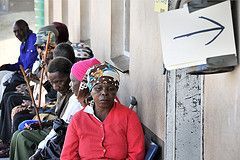Ebola Virus Outbreak Reaches Guinea’s Capital, With 4 Newly Confirmed Cases

The Ebola virus outbreak in West Africa seems to have gone from bad to worse, with confirmations that the virus has now spread to the Guinea capital city of Conakry. Guinean officials confirmed that they have identified four cases of the Ebola virus in Conakry. Sixty-three deaths have already been attributed to the virus in more rural areas of the country. In a city with three million people living in such close proximity, this virus is now at risk of spreading even more rapidly.
Current Outbreak
Dr. Sakoba Keita, a spokesman for the health ministry, announced Friday the arrival of Ebola to the capital city, The Associated Press reported. All four of the cases had come in contact with the body of an earlier victim. Anyone who has taken part in the burial of an Ebola victim may be soon subjected to quarantine. There have been reports of the virus in neighboring Uganda and the Democratic Republic of the Congo. Liberia, Senegal, and Sierra Leone are on high alerts due to close borders.
Transmission
Ebola is a highly communicable disease and is most commonly transferred through contaminated blood, or other bodily secretions of contaminated hosts. Experts believe the outbreak most likely began with an exchange of the virus from an animal to a human. Past outbreak have most commonly began place in areas where there are high levels of poaching. The World Health Organization revealed in a recent article that they believe that the fruit bat is the natural host of the Ebola virus, although now it is found in a variety of different mammals such as chimpanzees, gorillas, monkeys, forest antelopes, and porcupines. Health workers who treat Ebola patients in areas where infection controlled precautions are not strictly practiced are also at risk for infection as well. The most catastrophic outbreak of Ebola occurred in 1976 in the Democratic Republic of the Congo. The virus claimed 280 lives, with a fatality rate at 88 percent, according to WHO records.
Symptoms
Ebola, or Ebola hemorrhagic fever, induces fever, intense weakness, muscle pain, headache, and sore throat, according to the WHO. This is soon followed by vomiting, diarrhea, rash, kidney and liver problems, and in some cases both internal and external bleeding. Its incubation period is from two to 21 days and people can pass on the virus for as long as it remains in their blood, which can be up 61 days. Victims offer suffer from extreme dehydration and require intensive supportive care.
Prevention
There is no cure for Ebola and the virus has a 90 percent mortality rate. Currently there are several vaccines being tested for the virus, however, none are yet available for clinical use. When an area is suspected of housing an outbreak, quarantine quickly follows. Animals thought to be infected with the virus are culled and burned in an effort to minimize its spread. The most effective method of prevention is educating the public on the virus’s transmission methods and symptoms.



























